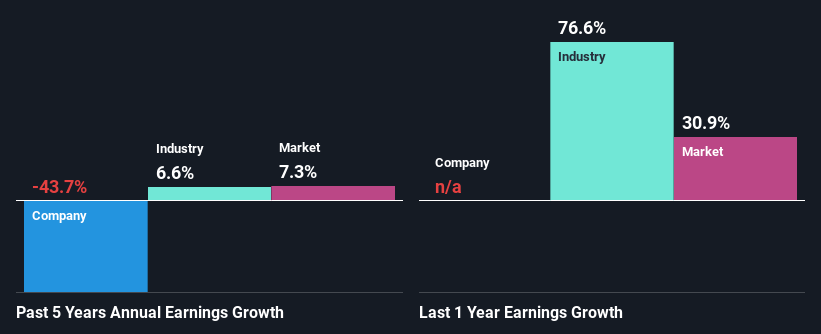Are Poor Financial Prospects Dragging Down The Unite Group plc (LON:UTG Stock?
With its stock down 3.8% over the past three months, it is easy to disregard Unite Group (LON:UTG). Given that stock prices are usually driven by a company’s fundamentals over the long term, which in this case look pretty weak, we decided to study the company's key financial indicators. In this article, we decided to focus on Unite Group's ROE.
ROE or return on equity is a useful tool to assess how effectively a company can generate returns on the investment it received from its shareholders. In other words, it is a profitability ratio which measures the rate of return on the capital provided by the company's shareholders.
Check out our latest analysis for Unite Group
How Is ROE Calculated?
The formula for ROE is:
Return on Equity = Net Profit (from continuing operations) ÷ Shareholders' Equity
So, based on the above formula, the ROE for Unite Group is:
2.5% = UK£84m ÷ UK£3.4b (Based on the trailing twelve months to June 2021).
The 'return' is the amount earned after tax over the last twelve months. That means that for every £1 worth of shareholders' equity, the company generated £0.02 in profit.
Why Is ROE Important For Earnings Growth?
So far, we've learned that ROE is a measure of a company's profitability. Based on how much of its profits the company chooses to reinvest or "retain", we are then able to evaluate a company's future ability to generate profits. Generally speaking, other things being equal, firms with a high return on equity and profit retention, have a higher growth rate than firms that don’t share these attributes.
A Side By Side comparison of Unite Group's Earnings Growth And 2.5% ROE
It is hard to argue that Unite Group's ROE is much good in and of itself. Even when compared to the industry average of 8.4%, the ROE figure is pretty disappointing. For this reason, Unite Group's five year net income decline of 44% is not surprising given its lower ROE. We believe that there also might be other aspects that are negatively influencing the company's earnings prospects. For example, the business has allocated capital poorly, or that the company has a very high payout ratio.
That being said, we compared Unite Group's performance with the industry and were concerned when we found that while the company has shrunk its earnings, the industry has grown its earnings at a rate of 6.6% in the same period.
The basis for attaching value to a company is, to a great extent, tied to its earnings growth. What investors need to determine next is if the expected earnings growth, or the lack of it, is already built into the share price. Doing so will help them establish if the stock's future looks promising or ominous. What is UTG worth today? The intrinsic value infographic in our free research report helps visualize whether UTG is currently mispriced by the market.
Is Unite Group Efficiently Re-investing Its Profits?
Unite Group has a very high three-year median payout ratio of 82%, implying that it retains only 18% of its profits. However, it's not unusual to see a REIT with such a high payout ratio mainly due to statutory requirements. Accordingly, this likely explains why its earnings have been shrinking.
Moreover, Unite Group has been paying dividends for at least ten years or more suggesting that management must have perceived that the shareholders prefer dividends over earnings growth. Based on the latest analysts' estimates, we found that the company's future payout ratio over the next three years is expected to hold steady at 80%. However, Unite Group's ROE is predicted to rise to 4.3% despite there being no anticipated change in its payout ratio.
Summary
Overall, we would be extremely cautious before making any decision on Unite Group. As a result of its low ROE and lack of much reinvestment into the business, the company has seen a disappointing earnings growth rate. With that said, we studied the latest analyst forecasts and found that while the company has shrunk its earnings in the past, analysts expect its earnings to grow in the future. Are these analysts expectations based on the broad expectations for the industry, or on the company's fundamentals? Click here to be taken to our analyst's forecasts page for the company.
This article by Simply Wall St is general in nature. We provide commentary based on historical data and analyst forecasts only using an unbiased methodology and our articles are not intended to be financial advice. It does not constitute a recommendation to buy or sell any stock, and does not take account of your objectives, or your financial situation. We aim to bring you long-term focused analysis driven by fundamental data. Note that our analysis may not factor in the latest price-sensitive company announcements or qualitative material. Simply Wall St has no position in any stocks mentioned.
Have feedback on this article? Concerned about the content? Get in touch with us directly. Alternatively, email editorial-team (at) simplywallst.com.

 Yahoo Finance
Yahoo Finance 
